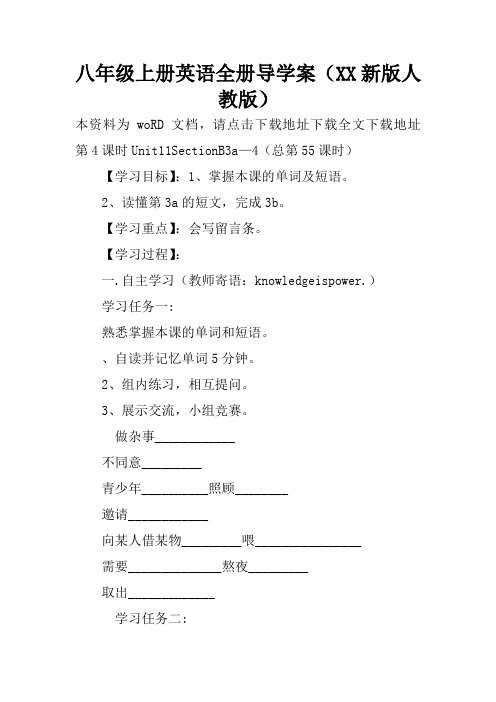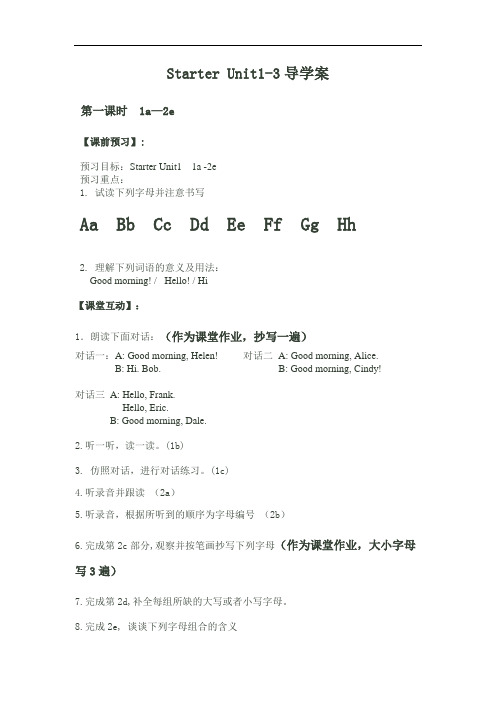八年级英语Unit11导学案5
- 格式:doc
- 大小:89.50 KB
- 文档页数:3

八年级上册英语全册导学案(XX新版人教版)本资料为woRD文档,请点击下载地址下载全文下载地址第4课时Unit11SectionB3a—4(总第55课时)【学习目标】:1、掌握本课的单词及短语。
2、读懂第3a的短文,完成3b。
【学习重点】:会写留言条。
【学习过程】:一.自主学习(教师寄语:knowledgeispower.)学习任务一:熟悉掌握本课的单词和短语。
、自读并记忆单词5分钟。
2、组内练习,相互提问。
3、展示交流,小组竞赛。
做杂事____________不同意_________青少年__________照顾________邀请____________向某人借某物_________喂________________需要______________熬夜_________取出_____________学习任务二:读懂3a短文,完成题目要求。
、小组讨论短文意思。
2、全班交流,教师点拨。
3、阅读3b小短文,完成第二部分。
4、组内交流,核对答案。
5、全班交流,教师点拨,背诵短文并展示。
Thanksfor+n./v-ingTakecareof=____________________ Takegoodcareof=_______________________ Givesb.sth.=givesth.Tosb.Feed…with/on…Feed…to…PlaywithForgettodosth.Forgetdoingsth.翻译:1)谢谢你来看我。
2)我不在时,请你照顾好自己。
3)睡觉前别忘了关灯。
4)我忘关窗户了。
5)吹喇叭打排球和小狗玩放这首曲子改同义句)Pleasegivemesomebananas.Please________somebananas_______________.2)mymotheraskedmetofeedgrasstothecow.3)mymotheraskedme________________thecow-___________grass..学习任务三:会用礼貌的语言表达对别人的请求,会写邀请信或留言条等作文:假如你是Sandy,你和你的父母准备去度假,请你给你的最好的朋友Rose留个便条,请她帮你照看你的兔子。


外研版八年级英语下册导学案Module 5 CartoonsUnit 1 It’s time to watch a cartoon.一、学习目标:1.一般现在时、一般过去时和现在完成时的区别。
2.能听懂和阅读关于介绍卡通片的语言材料,能通过相关词汇和图片描述自己和他人的对卡通片的观点;能编写关于卡通片的对话。
3.学会倾听他人的对卡通片的看法;养成关心、帮助他人的良好品质;认识到动画片的悠久和灿烂。
二、重点及难点:三种时态的区分。
三、学习步骤:Step 1 Lead-in1. Ss watch the video and answer “What’s this cartoon about?”.2. Ss look the pictures and answer the questions.Do you know this cartoon?What’s the name of the cartoon?What do you think of the cartoon?Step 2 New wordsLook and say. The teacher shows the pictures of new words and let the students to say as quickly as possible.1. cartoon n.漫画;动画片2. handsome adj. 英俊的3. smart adj. 聪明的4. sky n. 天空5. cool adj. 酷的6. hero n. 英雄;男主角7. humorous adj. 幽默的8. laugh v. 笑9. lesson n.经验;教训Step 3 Answer the questions1.What kind of cartoons do you like?2.Do cartoons always end in a happy way?3.What cartoons do you think are funny?Step 4 Listening1. Listen to Part 2 and find out Betty’s and Tony’s answers to the questions in Activity 1.brave, cartoon, cute, funny, handsome, smart2. Now work in pairs and check. Do they like the same cartoons as you?3. Listen to Part 3 and answer the following questions.1) Wh at are Tony and Daming talking about?2) What does Daming think is better?Answers: 1. They are talking about cartoons.2. He thinks Superman is better.Step 5 Reading1.Now answer the questions.1. What does Tony think about Spiderman?2. Why does Daming think Superman is better?3. Why do they both like Tom and Jerry?4. What lesson can Tony learn from Tom and Jerry?Answers: 1. Spiderman can’t fly, but he climbs up buildings with his hands and feet. That’scool.2. Becaus e he’s stronger th an Spiderman. He can fly though the skyand fight badpeople.3. Because Tom and Jerry are very funny.4. They fight a lot, but t hey really love each other.Step 6 Everyday EnglishLet Ss say what they have learnt in the passage.Step 7 Language pointsSs should master the main points from the passage in Part 3.If possible, let the students to say at first.1. Do cartoons always end in a happy way? 卡通片常以快乐的方式结束吗?in a … way 表示“以一种…的方式”。

Starter Unit1-3导学案第一课时 1a—2e【课前预习】:预习目标:Starter Unit1 1a -2e预习重点:1. 试读下列字母并注意书写Aa Bb Cc Dd Ee Ff Gg Hh2. 理解下列词语的意义及用法:Good morning! / Hello! / Hi【课堂互动】:1.朗读下面对话:(作为课堂作业,抄写一遍)对话一:A: Good morning, Helen! 对话二A: Good morning, Alice.B: Hi. Bob. B: Good morning, Cindy!对话三A: Hello, Frank.Hello, Eric.B: Good morning, Dale.2.听一听,读一读。
(1b)3. 仿照对话,进行对话练习。
(1c)4.听录音并跟读(2a)5.听录音,根据所听到的顺序为字母编号(2b)6.完成第2c部分,观察并按笔画抄写下列字母(作为课堂作业,大小字母写3遍)7.完成第2d,补全每组所缺的大写或者小写字母。
8.完成2e, 谈谈下列字母组合的含义HB CD BBC【及时练习】一.写出下列字母相应的大小写A b C d E f g H二.写出下列字母相邻的字母AEg三.从B栏中找出A栏的答语.()1. Good morning. A、I’m fine.()2. Hello. B、Hi.()3. How are you? C、Good morning.()4. Hi. D、Hello.()5. Good afternoon. E、Good evening!()6. Good evening! F、Good afternoon.四.按正确顺序默写大小写字母Aa-Hh_____________________________________________________________________ _____________________________________________________________________ _____________________________________________________________________ _____________________________________________________________________ 第二课时 3a-3d预习目标:3a-3dHelen、 Bob、 Feank、 Alice、 Cindy、 Dale、 Eric、 Grace.2.理解下列句子的意义及用法:How are you? / I’am fine,thanks.【课堂互动】:1.朗读下列对话Conversation 1(对话一): A: Good morning/afternoon/evening,Bob.B: Good morning/afternoon/evening,Alice.Conversation 2(对话二):A: Good afternoon, Dale.B:Hi, Cindy.! How are you?A: I’m fine, thanks. How are you?B: I’m OK.2.两人一组练习上面的对话。

.word格式.人教版八年级英语上册导学案全册备注:本文档包括整册书10个单元的导学案,环节齐全,思路清晰,练习到位,是教师备课的助手,更是学生自主学习英语的必备资料!Unit1Wheredidyougoonvacation?(SectionA)课时:第1-2课时学习目标:1.学会谈论过去的事2.学会谈论节假日的活动学习重点:1.一般过去时的陈述句,一般疑问句及回答和特殊疑问句学习难点:熟练使用本单元重点句型,进行日常交流。
一、课前尝试:(一)写出下列动词的单三,现在分词和过去式(gogoesgoingwent)1.be________________2.study________________3.watch________________4.eat________________5.have________________6.sit________________7.see________________e________________(二)词汇知识先知道:1.dear(同义词)________2.guide(名词)______3.friendly(反义词)_______4.friendly(名词)_____5.activity(复数)__6.dislike(反义词)____7.like(反义词)_____8.decide(名词)___________9.make(过去式)____10.building(动词)________11.visit(名词)____________12.go(过去式)______13.wait(名词)___________14.difference(形容词)____15.cry(现在分词)___(三)短语互译:1.呆在家里__________2.由于__________3.看望我叔叔_________4.去夏令营___________5.去爬山________6.去海滩__________二、课堂探究(一)Doyouknowhowtotalkaboutpastevents?你知道如何谈论过去发生的事吗?(二)Howtoasktheweather?1.What’stheweatherliketoday?同义句____________________翻译___________________.专业资料.学习参考..word格式.3.Whatwastheweatherlikeyesterday?同义句________________翻译___________________(三)Totalkabout“Whatdidyoudoonvacation?”(四)用所给词的适当形式填空2.JimandBob___________(come)toChinalastmonth.3.LiLei_________________(notgo)tobeduntil12o’clocklastnight.Sohe______(get)uplate.4.Anna__________(read)Englishyesterdaymorning.5.There_________(be)noonehereamomentago.6.I___________(call)Lucythismorning.7.Ilistenedbut___________(hear)nothing.8.Mary___________(begin)tolearnChineselastyear.stweekwe_________(pick)manyapplesonthefarm.三、课后检测:(一)用所给词的适当形式填空2.Jack______(be)oftenlateforschoollastterm.3.Itwas______(rain)yesterdaybutitissunnytoday.4.Wehavegreatfun_______(learn)English.5.Thedogmadethebaby________(cry).6.Canyouhelpme________(study)English?7.What______you_______lastnight?(do)8.We______(go)tothemuseumyesterday.Itwas_____(crowd).9.Lucy_______(write)twoletterstoherfriendstwodaysago.(二)认真阅读下列句子,选出最佳答案.()1.How__________yourvacation?-Itwasprettygood.A.wasB.wereC.didD.is()2.Where__________theygoyesterday?TheywenttotheSummerPalace.A.areB.doC.didD.were()3.---Wheredidyougoonvacation?I__________mygrandma.A.visitB.visitedC.visitsD.amvisiting()4.Bettystayedathomeand__________forthetestlastweekend.A.studyB.studyedC.studiedDstudies四、作业设计:单项选择()1.Theboysarehavinggreatfun______inthewaves.A.playB.toplayC.playedD.playing()2.Thankyouverymuchfor_________ussowell.A.teachB.teachingC.teachesD.taught()3.How’stheweatherinShanghai?________.A.Itraining.B.ItisrainC.Itisrainy.D.Itrainy.()4.Ithasfive_______yearsofhistory.A.thousandB.thousandsC.thousandofD.thousandsof ()5.—When_______asportsmeeting?---LastMonday.A.hadyouB.doyouhaveC.didyouhaveD.willyouhave.专业资料.学习参考..word格式.()6.Howisitgoing?______.A.It'ssunny.B.It'shot.C.It'sright.D.It'sprettygood()7.Listen!Who________?A.singssowellB.issingsowellC.issingingsowellD.singingsowell()8.“Youareaverybeautifulgirl.“________””A.No,I’mnot.B.Sorry,IdonC.’T h t a.nkyou.D.Yes,Ido.()9Hedidn’thave__m__o_neyforataxi,______hewalkedbacktothehotel.A.any,andB.much,becauseC.any,soD.some,so()10.OnSundaymorningIhelpedmymother____thecooking.A.doB.todoingC.doesD.doing()11.---__________?---Hedidsomereadingathome.A.WhatdoesyourfatherdoyesterdayeveningB.WhatdoesyourbrotherdointheschoolC.WhatdidyourbrotherdoovertheweekendD.WheredidyourbrothergolastSundayUnit1Wheredidyougoonvacation?(SectionB)课时:第3-4课时学习目标:1.学会如何用一般过去时谈论发生在过去的事情:学习重点一般过去时学习难点:Howtousekeep,enoughandsuch⋯thatcorrectly:学习过程一、课前尝试:(一)英汉互译:(一)熟读S ectionB3a,然后完成下列英汉互译1.发现某人正在做某事_______________丢2.失,失踪,迷路____________________10.帮助某人做某事__________________使4得.某人⋯⋯做某事__________________10.决定去做某事___________________6.走回某地_______________________4.打排球______________________8.干⋯⋯事很愉快__________________6.记日记_______10.thePalaceMuseum_________8.整天________________12.步行回到某地________________9.足够的钱________13.和我妹妹一起去_______二、课堂探究:(一)enough的用法(二)1.so+形容词或者副词+that+从句意思是:如此...以致于结果状语从句2.such+a/an+形容词+名词+that+从句,当名次是不可数或者复数时,用such+形容词+不可数名词或者复数+that+从句Thosearesuchbeautifulflowersthatwealllikethem.3.too+形容词或者副词+todosth意思是:太...而不能Theboyistooyoungtocarrythebox.4.形容词/副词+enough+todosth意思是:...足够去做某事Theboyisoldenoughtogotoschool..专业资料.学习参考..word格式.实战演练:同义句转换4.ThisissoheavyaboxthatIcan'tcarryit5.ThisisaheavyboxIcan'tcarryit6.Thisboxisheavymecarry7.Thisboxisn'tcarry三、课后检测:(一)根据所给句意及首字母提示完成下列单词拼写使句意通顺完整。

八年级英语上册unit5知识精讲导学案(人教新目标)人教新目标英语八年级上册Unit 5 Do you want to watch a game show?知识点精讲1. What is your favorite cartoon?你最喜欢的卡通片是什么?“ what’ s your favorite…? 是用来询问对方最喜爱事物是什么.其同义句为“ what…do you like best?回答用: My favorite book is …或是I like …best.e.g. --what’s your favorite book?= what book do you like best?-- My favorite book is Snow White. 或是I like Snow White best.2. When people say “culture”, we think of art and history.当人们提起文化时,我们就会想到艺术和历史.think of 有考虑;想起;有…想法;对…有意见等意思.在该句中应理解为“ 想起,想到”.例如:Does the poem make you think of spring?这首诗有没有让你想到春天?How many stars can you think of?你能想到多少明星?3. When this cartoon came out in New York on November 18, 1928, it was the first cartoon with sound and music.当这部动画片于1928 年11月18 问世于纽约时,它成为第一部带有音乐的动画片.“come out” 在本句中译为“ 出版” 引申为“ 问世”.此外还有:出来,(花)开出来之意.e.g. The book comes out this week. 该书本周上市.Oh, look! The sun's coming out!噢,看!太阳出来啦!4. One of the main reasons is that Mickey was like a common man, but he always tried to face any danger.一个主要原因是米奇看似一个普通人,但他总是尝试应对任何危险.one of …后跟可数名词复数,表示…之一.其后的谓语动词用单数.即: one of +(形容词最高级) + 名词复数e.g. Ann is One of my best friends.安是我最好的朋友之一.Shanghai is one of the biggest cities in China.5. However, he was always ready to try his best.然而,他总是做好尽全力的准备.1) be ready to do sth 准备做某事,与get ready to do sth同义,但前者强调状态,后者强调动作.e.g. Are you ready to start? 你准备好了吗?Please get ready to start.请作好开始的准备.2) Try one’s best 尽某人最大的努力,其后跟动词不定式形式,即:try one’s best to do sth.e.g. Don't give up. Just try your best.不要放弃.只管尽你最大的努力.Come on!Just try your best to let your dream come true.加油!尽最大的努力去实现你的梦想吧.6. People went to the cinema to see the “little man” win.人们去电影院是为了看这个“ 小人儿” 赢.go to the cinema 也可译为“ 看电影”类似表达如下:go to movies/go to a movie /go to see a movie.7. Today’s cartoons are usually not so simple as little Mickey Mouse.现在的卡通片通常不像米老鼠那样简单.此句中not so… as 结构表示“ 不像……那样……; 不如……这么……”.又如:It wasn’t so good as last time. 这次不如上次好.It is not so easy as you’d think. 这不像你想的那样简单.8. She dresses up like a boy and takes her father’s place to fight in the army.她女扮男装,替父上战场打仗.1)dress up “盛装打扮、乔装打扮”.e.g. I’d like you to dress up for my birthday party tonight.今晚我希望你为我的生日派对打扮打扮.Young kids often dress up and have fun at Halloween.万圣节前夜,小孩子通常都乔装打扮,玩得很开心.2)take one’s place 取代某人的位置,顶替.Mulan takes her father’s place to fight in the army.take sb’s place to do sth. 替代某人的位置做某事2. They did a good job in the movie.他们在电影中表演出色.do a good job 好好干;干得好; 干得出色e.g. I'm sure you can do a better job next time.我相信你下次会干得更好.You've done a good job of it. 你干得太漂亮了!9. joke名词玩笑,笑话;笑柄.讲笑话“tell a joke/jokes”当做动词:开玩笑(+about/with);开...的玩笑,戏弄. 例如:He’s the joke of the whole village.他是全村的笑柄.I’m only joking. 我只是开玩笑而已.【针对练习】Don’t take my little ________ too seriously. I’m only ___________.A. joke; jokeB. joke; jokingC. joking; jokeD. joking; joking10. What comedy shows do you like to watch?comedy喜剧,喜剧片;复数形式为comedies.例如:Lost in Thailand(泰囧) is a comedy.【针对练习】—What do you think of the ______________? —I don’t mind them.A. comediesB. comedyC. comedysD. comedyes11. How about you?how about和what about同义,用法也相同.About是介词,后面除了名词,代词以外,还可以跟动名词或介词短语.how/what about用来询问或打听情况,或用来提出请求,建议或征求意见,意思为“…怎么样?”“…如何?”例如:I am tired. What about you? 我很累了,你呢?How about going out for a walk? 出去散步怎么样?【课堂探究】12. What do you think of soap operas? 你认为肥皂剧怎么样?What do / does + sb. + think of ...? 意为“某人认为……怎么样?”,用来询问对方对某人或某物的观点或看法,相当于How do / does sb. like ...? 但要注意,这两句中的what与how不可混用.例如:What do you think of this book?同义句为How do you like this book?【针对练习】你认为这本书怎么样?_________ do they__________ the movie “Home Alone”?A. How; likeB. What; likeC. What; think ofD. How; think of13. stand意为“忍受(疼痛、侮辱、艰难等)”,常用在否定句中.例如:I can’t stand that performer. 我不能容忍那个演员.stand后还可以接V-ing形式或动词不定式.例如:I can’t stand waiting / to wait any longer. 我不能忍受再等下去.14. mind用作动词时,意为“介意”,后接名词、代词或动名词.例如:I don’t mind them. 我不介意它们.“Would you mind (not) doing sth.?”用来委婉请求他人(不要)做某事.如:Would you mind not smoking here? 你介意不要在这儿吸烟吗?【课堂探究】15. meaningless 形容词,意为“毫无意义的;意思不明确的”. 反义词为:meaningful意味深长的,由meaning+后缀less构成.一般名词后加less后缀构成形容词.意为:没有,无.例词:careless 粗心的;friendless 没有朋友的;helpless无助的;homeless无家可归的【针对练习】1) The book is __________ to him, so he doesn’t like it.A. meaninglessB. meaningfulC. meaningD. mean2) After Ya’an earthquake, many people become ______________. We should help them.A. homeB. homelessC. happyD. happily【课堂探究】16. famous是形容词;词组“be famous for”表示人“以某种知识技能,作品或特征而出名”,表示某地“以某种特产或特征出名”,或表示某事“以其内容、特征、价值等而被人所知”.例如:He is famous for his skill in playing football. 他因球艺而出名.Mark Twin was famous as a children-story writer. 马克·吐温作为儿童故事作家而著称.【针对练习】1) 杭州以产绿茶而著称.Hangzhou _______ ________ _______ its green tea.2) Yao Ming is ____________ being a basketball player.A. famous forB. famous asC. famousD. famous to17. successful为形容词,意思为“达到目的,有成效的;获得成功的,有成就的.例如:be successful in sth/doing sth;be successful at sth/doing sth;a successful actor 有成就的演员.18. find 与find out 的区别find 意为“找到;发现”,强调动作的结果.e.g. Mr. Li found his lost keys in the library.李老师在图书馆里找到了他丢失的钥匙.find out查明; 弄清(指通过调查、研究等方式查明事情的真相)e.g. Did they find out where the old man lived ?他们查明那位老人住在哪里了吗?19. plan to do sth. 计划/打算做某事We plan to have a birthday party for Mary.20. hope to do sth. 希望做某事(能实现的理想)They hope to take the plane to Beijing next year.他们希望来年乘飞机去北京.21. expect to do sth期待做某事III. 根据汉语提示完成英语句子.1. 她无法忍受体育节目.________________________________________________________________________________ 2. 你介意情景剧吗?________________________________________________________________________________ 3. 我哥哥喜欢体育世界而我姐姐喜欢情景喜剧.________________________________________________________________________________ 4. —你觉得游戏节目怎么样?—我忍受不了.----________________________________________________________________________________ ----________________________________________________________________________________ 5. 有一天我想成为电视台记者.________________________________________________________________________________ 6. 今晚我打算看体育世界.________________________________________________________________________________ 7. 她期待有一天去参观北京.________________________________________________________________________________ 8. 你认为济南的天气怎么样?________________________________________________________________________________ 9. 她喜欢看什么样的喜剧节目?________________________________________________________________________________ 10. 我的妹妹不能忍受新闻节目.________________________________________________________________________________ 11. 我弟弟喜欢看卡通片.________________________________________________________________________________ 12. 我爷爷喜欢访谈节目是因为有教育意义.________________________________________________________________________________ 13. 李连杰演了很多动作片.(make)________________________________________________________________________________ 14. 20世纪三十年代,他以米老鼠为原形制作了87部卡通片.________________________________________________________________________________ 15. 雷锋总是时刻准备着帮助别人.________________________________________________________________________________ 16. 谁有一对比Mickey还出名的耳朵呢?________________________________________________________________________________ 17. 一些人也许会问这个卡通动物如何变得这么受欢迎.________________________________________________________________________________ 18. 你能想出和Mickey一样著名的卡通人物吗?________________________________________________________________________________19. 这部电影表达了木兰对家人,朋友还有国家的爱.________________________________________________________________________________ 20. 我认为那名女演员把木兰这个角色演绎得非常好.________________________________________________________________________________ 21. 如果你打算看些让人高兴的节目,选择Happy Camp.________________________________________________________________________________ 22. 在圣诞节那天,他常打扮成圣诞老人的模样.________________________________________________________________________________ 23. —我已经做完了作业. —做得非常好.—________________________________________________________________________________ —________________________________________________________________________________。
八年级上册英语全册导学案(人教版)1熟练掌握词汇:atereln,shae,pur, purint turn n, ut up, gurt, hne, need2熟练掌握以下句型:(1)ut up the bananas (2)pur the il int the blender (3)H d u ae…? (4) H uh …d u need?技能目标:1,会用本节新词和短语,能听说读写;2能听懂,读懂描述程序的听力材料,能就某个操作程序对话,初步书面编写这样的对话;情感目标:培养学生热爱劳动和独立自主的生活态度。
学习过程:一、自主学习(做学习的主人!)(一)Previe steps and ethds(预习步骤及方法):(新知识,早知道)前预习Ⅰ回顾你所学过的有关食物的单词,并将其分类,比一比谁写的多。
Drin:_______________________________Fruit:_______________________________Vegetables:__________________________Fd:________________________________ Ⅱ和同伴合作,把这些食物按可数和不可数名词分类。
可数名词:___________________________ 不可数名词:__________堂学习 Befre listening 1结合前准备Ⅰ的内容,完成1a。
2运用生活常识,依据图画提示,通过和伙伴的探讨,了解制作水果奶昔的步骤。
(二)听力练习1b,2a,2b,并完成相应任务二、合作交流:-peratin( 三个臭皮匠,顶个诸葛亮,T heads are better than ne) 小组练习对话1,2。
三、展示点拨:Displa (弘扬个性,展示讲解,让我们共同分享成功的喜悦!)Rle pla the nversatins in 1 and 2 Sh t the lasses四、巩固提升:Exerise in lass (别低估了自己的潜力!)根据首字母提示补全单词,使句子完整通顺。
Unit5:Do you want to watch a game show ?Section A一、单词、短语、句型默写1、情景喜剧2、新闻节目、新闻3、肥皂剧4、介意、头脑、心智5、忍受、站立6、教育的、有教育意义的7、打算、计划8、希望9、查明、弄清10、讨论、商量11、发生、出现12、预料、期待13、笑话、玩笑14、喜剧、喜剧片15、看游戏节目16、谈话节目17、运动节目18、才艺节目19、你认为谈话节目怎么样?20、看新闻21、一点点枯燥22、向/从......学习23、更有教育意义24、问题的答案25、看情景喜剧是放松的很好的方式。
26、我不能忍受肥皂剧。
27、我不介意它们。
28、我希望找出世界各地发生了什么事情。
29、开展关于......的讨论30、我最喜欢的电视剧节目31、我希望有一天成为电视台记者。
二、单元语法讲练动词不定式是动词的一种非谓语形式,,其结构是“to+动词原形”,动词不定式的否定形式是在to前面加上not(即not+to+动词原形)。
动词不定式的用法如下:1、作主语:动词不定式作主语通常用it来作形式主语,而把动词不定式结构放在句子后面。
常见句型:It’s +形容词+for sb +to do sth .(翻译)喂养动物是我的工作。
对于我们来说早上读英语是很重要的。
2、作宾语或宾语补足语:即两个动词在一个句子中前后通常用to连接,to后跟动词原形。
注意:动词不定式的否定形式是在to前面加上not。
(翻译)他想去购物。
他想要我保持房间整洁。
我决定了什么时候去旅行。
他要求我在上学的日子不要看电视。
注意:(1)一听(hear)二看(see、watch)三使让(make、let)后跟动词原形不加to。
I hope I can make my dream (come) true one day . I saw them(bring)out the best in them on TV yesterday .(2)有些动词如like、love、enjoy、spend、finish、keep、mind、practice等后面的动词只能接动词ing形式。
综合复习编写人隗功霞备课组长签字教研主任签字班级______小组____姓名__________ Unit5 Do you want to watch a game show?一.Words情景喜剧肥皂剧有教育意义的查明,弄清喜剧新闻忍受希望发生介意笑话打算,计划预料,期待讨论毫无意义动作影片文化,文明出现富有的可能,可以原因电影失去准备好的人物装扮,乔装打扮陆军行动动画片著名的开始变得有成就的主要的普通的不幸的女朋友准备好做某事简单的好莱坞代替,替换干得好米老鼠二.Phrases1.介意做某事mind doing2.介意某人做某事mind sb doing/ mind on e’s doing3.看访谈节目watch talk shows4. 向某人学习learn (sth) from sb.5.学习许多关于...的知识learn a lot about6. 计划做某事plan to do sth7.希望做某事hope to do sth/ hope that 从句8.希望某人做某事wish sb to do sth9.发生, 进行go on,/ happen发生在某人身上happen to sb.碰巧做某事happen to do sth10.进行关于…的讨论have a discussion about sth11.跟随某人follow sb12. 接下来发生什么What happens next ?现在正在发生什么事? What is happening now?昨天发生了什么事? What happened yesterday?明天将要发生什么事? What will happen tomorrow?13. 昨天Tom 发生什么事了?What happened to Tom?14. 期待做某事expect to do sth15.期待某人做某事expect sb to do sth16. 想起think of17. 美国文化的一个著名象征one very famous symbol in American culture18. 因……而出名be famous for China is famous for the Great Wall.19.作为......而出名be famous as Yao Ming is famous as a basketball player.20.第一个有声和音乐的卡通the first cartoon with sound and music21. 出版, 发行come out22.受到某人的欢迎be popular with sb.13其中的一个主要原因one of the main reason s24. 一个普通人 a common man25. 人们去电影院看小人物羸people went to the cinema to see the little man win.26.看到某人做了/经常做某事see sb do sth.27.看到/听到/发现某人正在做某事see/ hear/ find sb doing sth.28.尽最大努力去做某事try one’s best to do sth.29. 面对任何危险face any danger30.准备做某事be ready to do sth.(表示结果) get ready to do sth.(表示动作)for sth for sthHe is ready to win the game. 他准备好了赢得比赛.(信心十足)He is getting ready to win the game. 他正在为赢得比赛做准备.(在做准备工作) Everything is ready. Let’s have dinner. 一切都准备好了,咱们吃饭吧.Tomorrow we are going to take a trip to Wuhan. Do you getting everything ready?明天我们就要去武汉旅行了, 你把一切都准备好了吗?31.失去家园lose one’s home / house32他们中的大多数/许多/一些/ 一个/所有most/ many/ some/one / all of them 33. 第一个做某事的人the first one to do sthHe was the first one to get to school.他是第一个到校的人.The boy is always the first one to finish work.这个男孩总是第一个完成工作的人.34.一部令人激动的动作电影an exciting action movie35.来自,’’come from , be fromWhere are you from? Where do you come from?Where is he from? Where does he come from?36. 一个古老的中国故事an old Chinese story37. 她打扮成一个男孩的样子she dresses up like a boy.get dressed 穿衣服dress oneself, 给自己穿衣服dress up 盛装打扮dress up like 打扮成。
一、知识目标1. 掌握词汇: snack, teenager, borrow, invite, player2. 掌握句型: --- Could you please take out the trash? ---Sure. / --- Sorry, I can’t. I have to……3. 学习语法: 情态动词could表示委婉请求或请求许可二、能力目标: 运用目标语言---Could you clean your room? ---Could I invite my friends to a party?一、温故知新(Revision) : 用所给词的适当形式填空1. Thanks for________________(take) care of my dog.2. Don’t forget________________(make) your bed after you get up.3. He ____________(do) the dishes yesterday.4. Could you please help me _________________(sweep) the floor?5. Jim wants to go skating, but his friends ______________ (agree) with him, they want to go hiking.二、预习检测(Preview) 1. 借钱__________________________ 2. 邀请朋友们去聚会________3.买一些小吃____________________________4. 用一下你的CD机_________________________三、当堂训练(Practice):1. Finish the 1a, w rite “parents” or “teenagers” next to each ph rase.2. Role play conversations in1b.四、合作共建Please use the information of 2b and judge True or False.1. Sandy’s mother is going to buy some drinks and snakes for Sandy.___________2. Sandy isn’t going to borrow any money from her mother.___________3. Sandy and Dave are going to clean Sandy’s room.___________五、语法详解(Grammar):borrow sth from sb 从…处借来…lend sb sth = lend sth to sb 把…借给…用borrow 或lend 及相关短语填空, 完成句子。